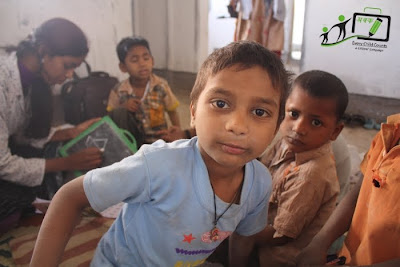Finally on one corner between lots of dust, boards, metal tubes and driven tools, I saw a group of around 20 children. It was the ECC (Every Child Counts) camp I had come to visit. The group consisted of very small children (about 2 or 3 years old), one baby and some children of age between 5 and 7. There were two teachers sitting on a pile of boards, between them a baby was sleeping. In front of them the class was sitting on the ground.
When I watched the situation from a distance, it kind of looked like an oasis of happiness in the middle of a desert of sorrow.
As I grew up in Germany, it is hard for me to understand the struggle of life being a member of a family of migrant labors. Facing the very poor conditions and the bad situation of their camps (no toilet, full of dirt, pigs in the mud and very small rooms), I was looking for every single smile or happy moment. And I found it in the classes.
All the children started to scream “Namaste” and laughed out loud when they saw me. I took out my camera and some kids started to pose in front of it. One boy had found a small package of toothpaste and greased it all over his face. He seemed to be proud of having found something healthy for the skin because it smelled so good. He did not know it was toothpaste, because he does not know what toothpaste is. Everybody was laughing and I shared a happy moment due to a sad cause.
The teachers taught them a song with a dance when I joined them. After a few minutes of excitement they went on with the dance. The bigger children built a circle around the younger ones. They were singing and dancing around them. It was a kind of game and caused many laughs and shining eyes.
What would these children do the whole day when there was no opportunity like this? What would they be able to look forward to when thinking about the future? Every single child has the right to receive a proper education. Everybody knows that children represent our future. And isn’t the future something very precious? The only reason we do things the way we do is because we have a view to our future. And every human being wants to design its future as well as possible. Children need help on their way of education. They are dependent on the decisions of others until they are old enough to live on their own. It should be self evident to give as much support to our children as possible, thinking about this point of view. The only way to make the best out of our future is to give the best opportunities on education to our children.
I came out of the construction site with a smile on my face. It made me really happy to see that someone takes care of these children who seem to be so innocent and disadvantaged. At the same time, this question rose in my mind - so many other constructions are going on around…what happens to such children there?

Felix Korts (ECC Volunteer from Germany)
felix.korts@googlemail.com
http://everychildcounts-pune.blogspot.com












